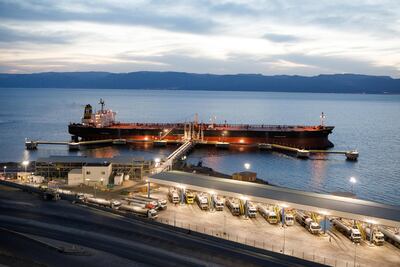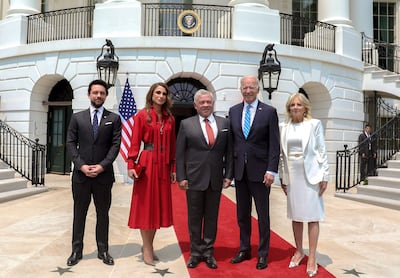Last week, Iran’s foreign minister, Hossein Amirabdollahian, visited Lebanon, on what many considered a visit to take advantage of the country’s economic crisis to tighten Tehran’s hold there. Mr Amirabdollahian said Iran was willing to help the Lebanese rebuild the Beirut port, large parts of which were destroyed in the explosion last year, as well as to construct two electrical power plants.
The Iranian pledges on economic assistance notwithstanding, the visit was eminently political. Iran and its Lebanese proxy Hezbollah can see that in the past year several regional and international actors have sought to play a role in Lebanese affairs – Arab states such as Egypt, Jordan, Qatar, and even Syria, as well as European countries such as France, not to mention the US. The Iranians want to contain such efforts to preserve Iran’s supremacy.
Yet what is revealing in the approach of certain Arab states, notably Egypt and Jordan, is that they seem to accept that Iran cannot be sidelined in the Levant. In their attitudes towards Lebanon and Syria, both countries have adopted a pragmatic attitude of increasing their stakes in countries dominated by Iran so as to build up influence and use this to bargain with the Iranians.
This reasoning appears to be behind the Egyptian and Jordanian decision to exploit the Arab natural gas pipeline that crosses Jordan, Syria and Lebanon to transport Egyptian gas to Lebanon for power generation. While Cairo and Amman have portrayed this as a means of helping a collapsing Lebanese power sector, the arrangement is more about geopolitics and regional calculations.
For the gas to arrive in Lebanon it would have to cross Syria, which is currently sanctioned under the Caesar Act – US legislation directed against the regime of Syrian President Bashar Al Assad for its wartime crimes. When King Abdullah of Jordan travelled to Washington in July, he appears to have persuaded the Biden administration to provide waivers to Jordan and Lebanon so the project could go forward and both countries would not be sanctioned under the act.
Indeed, it was the US ambassador in Beirut, Dorothy Shea, who announced the plan in August. The Americans, like an increasing number of Arab states, believe that if Lebanon were to disintegrate, Iran and Hezbollah alone would pick up the pieces and benefit. Preventing this is why they have altered their outlook.
Many Arab states are not yet ready to rehabilitate the Assad regime. However, they are willing to give it more leeway than before on the presumption that what Syria gains, particularly in Lebanon, will decrease the Iranians’ margin of manoeuvre and force Tehran to take broader Arab interests into consideration.
Isolating the Arab countries in which Iran holds sway has brought limited returns
Such thinking has been behind Jordan’s rapid rapprochement with Syria in recent weeks. This culminated in a telephone conversation between King Abdullah and Mr Al Assad on October 3, following the re-opening of the Jaber crossing between the two countries on September 27. In an interview with CNN’s Fareed Zakaria in July, the king had already signalled that a change in policy was coming.
The policy of isolating those Arab countries in which Iran has pre-eminent power has brought limited returns. If anything, it has allowed Tehran to consolidate its power in those countries, when the reality on the ground allows for more imaginative Arab policies when it comes to political and communal affairs.
In Lebanon, for example, the Shiite community makes up only around 30 per cent of the population, while Sunnis are as numerous. Yet Hezbollah has dominated because Arab countries have quarantined Lebanon and its Sunnis, thinking the country is a lost cause. This represents an untenable political opportunity cost.
The Egyptians and Jordanians, as well as others, are reconsidering the benefits of outside pressure, understanding that it rarely brings about desired changes. At the same time, they are taking advantage of the fact that the US considers the Middle East less of a priority than before, so is more willing to allow regional actors to establish a balance of power among themselves, on their own terms.
Mr Amirabdollahian's visit is certainly tied to the Iranians’ understanding that regional ambitions will oblige them to defend their advantages throughout the Arab world – in Lebanon, Syria, but also Iraq, and perhaps even Yemen down the line. The Middle East is seeing a return to politics, where it has become an open field in which regional and international actors are competing.
This may appear to be something new in the past 30 years, since the end of the cold war and US hegemony, but it is also very much ingrained in the region’s history. This is especially true of the Levant, which has long been a battleground for the region’s empires or major powers. It is no surprise then that the dynamics today are filling the void left by an American empire in deliberate retreat.
UAE currency: the story behind the money in your pockets
White hydrogen: Naturally occurring hydrogen
Chromite: Hard, metallic mineral containing iron oxide and chromium oxide
Ultramafic rocks: Dark-coloured rocks rich in magnesium or iron with very low silica content
Ophiolite: A section of the earth’s crust, which is oceanic in nature that has since been uplifted and exposed on land
Olivine: A commonly occurring magnesium iron silicate mineral that derives its name for its olive-green yellow-green colour
How to apply for a drone permit
- Individuals must register on UAE Drone app or website using their UAE Pass
- Add all their personal details, including name, nationality, passport number, Emiratis ID, email and phone number
- Upload the training certificate from a centre accredited by the GCAA
- Submit their request
What are the regulations?
- Fly it within visual line of sight
- Never over populated areas
- Ensure maximum flying height of 400 feet (122 metres) above ground level is not crossed
- Users must avoid flying over restricted areas listed on the UAE Drone app
- Only fly the drone during the day, and never at night
- Should have a live feed of the drone flight
- Drones must weigh 5 kg or less
Ziina users can donate to relief efforts in Beirut
Ziina users will be able to use the app to help relief efforts in Beirut, which has been left reeling after an August blast caused an estimated $15 billion in damage and left thousands homeless. Ziina has partnered with the United Nations High Commissioner for Refugees to raise money for the Lebanese capital, co-founder Faisal Toukan says. “As of October 1, the UNHCR has the first certified badge on Ziina and is automatically part of user's top friends' list during this campaign. Users can now donate any amount to the Beirut relief with two clicks. The money raised will go towards rebuilding houses for the families that were impacted by the explosion.”
COMPANY%20PROFILE
%3Cp%3ECompany%20name%3A%20CarbonSifr%3Cbr%3EStarted%3A%202022%3Cbr%3EBased%3A%20Dubai%3Cbr%3EFounders%3A%20Onur%20Elgun%2C%20Mustafa%20Bosca%20and%20Muhammed%20Yildirim%3Cbr%3ESector%3A%20Climate%20tech%3Cbr%3EInvestment%20stage%3A%20%241%20million%20raised%20in%20seed%20funding%3Cbr%3E%3C%2Fp%3E%0A
Sui Dhaaga: Made in India
Director: Sharat Katariya
Starring: Varun Dhawan, Anushka Sharma, Raghubir Yadav
3.5/5
The UAE squad for the Asian Indoor and Martial Arts Games
The jiu-jitsu men’s team: Faisal Al Ketbi, Zayed Al Kaabi, Yahia Al Hammadi, Taleb Al Kirbi, Obaid Al Nuaimi, Omar Al Fadhli, Zayed Al Mansoori, Saeed Al Mazroui, Ibrahim Al Hosani, Mohammed Al Qubaisi, Salem Al Suwaidi, Khalfan Belhol, Saood Al Hammadi.
Women’s team: Mouza Al Shamsi, Wadeema Al Yafei, Reem Al Hashmi, Mahra Al Hanaei, Bashayer Al Matrooshi, Hessa Thani, Salwa Al Ali.
The specs
Engine: 4.0-litre flat-six
Torque: 450Nm at 6,100rpm
Transmission: 7-speed PDK auto or 6-speed manual
Fuel economy, combined: 13.8L/100km
On sale: Available to order now
Specs
%3Cp%3E%3Cstrong%3EEngine%3A%3C%2Fstrong%3E%201.5-litre%20turbo%204-cylinder%20%2F%202.0%20turbo%204-cylinder%20(S3)%0D%3Cbr%3E%3Cstrong%3EPower%3A%3C%2Fstrong%3E%20148bhp%20%2F%20328bhp%20(S3)%0D%3Cbr%3E%3Cstrong%3ETorque%3A%3C%2Fstrong%3E%20250Nm%20%2F%20420Nm%20(S3)%0D%3Cbr%3E%3Cstrong%3EOn%20sale%3A%3C%2Fstrong%3E%20December%0D%3Cbr%3E%3Cstrong%3EPrice%3A%3C%2Fstrong%3E%20TBA%0D%3C%2Fp%3E%0A
Saturday's schedule at the Abu Dhabi Grand Prix
GP3 race, 12:30pm
Formula 1 final practice, 2pm
Formula 1 qualifying, 5pm
Formula 2 race, 6:40pm
Performance: Sam Smith
New UK refugee system
- A new “core protection” for refugees moving from permanent to a more basic, temporary protection
- Shortened leave to remain - refugees will receive 30 months instead of five years
- A longer path to settlement with no indefinite settled status until a refugee has spent 20 years in Britain
- To encourage refugees to integrate the government will encourage them to out of the core protection route wherever possible.
- Under core protection there will be no automatic right to family reunion
- Refugees will have a reduced right to public funds
Specs
Engine: 51.5kW electric motor
Range: 400km
Power: 134bhp
Torque: 175Nm
Price: From Dh98,800
Available: Now
Mohammed bin Zayed Majlis
ALRAWABI%20SCHOOL%20FOR%20GIRLS
%3Cp%3ECreator%3A%20Tima%20Shomali%3C%2Fp%3E%0A%3Cp%3EStarring%3A%C2%A0Tara%20Abboud%2C%C2%A0Kira%20Yaghnam%2C%20Tara%20Atalla%3C%2Fp%3E%0A%3Cp%3ERating%3A%204%2F5%3C%2Fp%3E%0A
RESULTS
6pm: Mazrat Al Ruwayah – Group 2 (PA) $40,000 (Dirt) 1,600m
Winner: AF Alajaj, Tadhg O’Shea (jockey), Ernst Oertel (trainer)
6.35pm: Race of Future – Handicap (TB) $80,000 (Turf) 2,410m
Winner: Global Storm, William Buick, Charlie Appleby
7.10pm: UAE 2000 Guineas – Group 3 (TB) $150,000 (D) 1,600m
Winner: Azure Coast, Antonio Fresu, Pavel Vashchenko
7.45pm: Business Bay Challenge – Listed (TB) $100,000 (T) 1,400m
Winner: Storm Damage, Patrick Cosgrave, Saeed bin Suroor
20.20pm: Curlin Stakes – Listed (TB) $100,000 (D) 2,000m
Winner: Appreciated, Fernando Jara, Doug O’Neill
8.55pm: Singspiel Stakes – Group 2 (TB) $180,000 (T) 1,800m
Winner: Lord Glitters, Daniel Tudhope, David O'Meara
9.30pm: Al Shindagha Sprint – Group 3 (TB) $150,000 (D) 1,200m
Winner: Meraas, Antonio Fresu, Musabah Al Muhairi
KILLING OF QASSEM SULEIMANI





